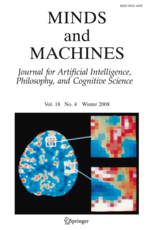Minds and Machines
 | |
| Discipline | Artificial intelligence, philosophy, cognitive science |
|---|---|
| Language | English |
| Edited by | Mariarosaria Taddeo |
| Publication details | |
| History | 1991–present |
| Publisher | |
| Frequency | Quarterly |
| 7.4 (2022) | |
| Standard abbreviations | |
| ISO 4 | Minds Mach. |
| Indexing | |
| CODEN | MMACEO |
| ISSN | 0924-6495 (print) 1572-8641 (web) |
| LCCN | 91650998 |
| OCLC no. | 37915831 |
| Links | |
Minds and Machines is a peer-reviewed academic journal covering artificial intelligence, philosophy, and cognitive science.[1]
The journal was established in 1991 with James Henry Fetzer as founding editor-in-chief.[2] It was published by Kluwer Academic Publishers but was taken over by Springer in 2021 (Springer Science+Business Media). Affiliated with the Society for Machines and Mentality, a special interest group within the International Association for Computing and Philosophy. The current editor-in-chief is Mariarosaria Taddeo (University of Oxford).[2]
Editors
Previous editors-in-chief of the journal have been James H. Fetzer (1991–2000), James H. Moor (2001–2010), and Gregory Wheeler (2011–2016).
Abstracting and indexing
The journal is abstracted and indexed by the following services:[1]
According to the Journal Citation Reports, the journal has a 2016 impact factor of 0.514.[3]
Article categories
The journal publishes articles in the categories Research articles, Reviews, Critical and discussion exchanges (debates), Letters to the Editor, and Book reviews.[1]
Frequently cited articles
According to the Web of Science, the following five articles have been cited most frequently:
- Edelman, S. (1995). "Representation, similarity, and the chorus of prototypes". Minds and Machines. 5: 45–68. doi:10.1007/BF00974189. S2CID 879875.
- Copeland, B. J. (2002). "Hypercomputation". Minds and Machines. 12 (4): 461–502. doi:10.1023/A:1021105915386. S2CID 218585685.
- Glymour, C. (1998). "Learning causes: Psychological explanations of causal explanation". Minds and Machines. 8: 39–60. doi:10.1023/A:1008234330618. S2CID 24720518.
- Floridi, L.; Sanders, J. W. (2004). "On the Morality of Artificial Agents". Minds and Machines. 14 (3): 349–379. CiteSeerX 10.1.1.16.722. doi:10.1023/B:MIND.0000035461.63578.9d. S2CID 5985008.
- Hadley, R. F.; Hayward, M. B. (1997). "Strong Semantic Systematicity from Hebbian Connectionist Learning". Minds and Machines. 7: 1–37. doi:10.1023/A:1008252408222. S2CID 8808083.
References
- ^ a b c "Minds and Machines Homepage". Springer Science+Business Media. Retrieved 2011-05-28.
- ^ a b "Minds and Machines: Editorial Board". Springer Science+Business Media. Retrieved 2010-10-05.
- ^ "Journals Ranked by Impact: Computer Science, Artificial Intelligence". Journal Citation Reports. Web of Science (Science ed.). Thomson Reuters. 2016.
